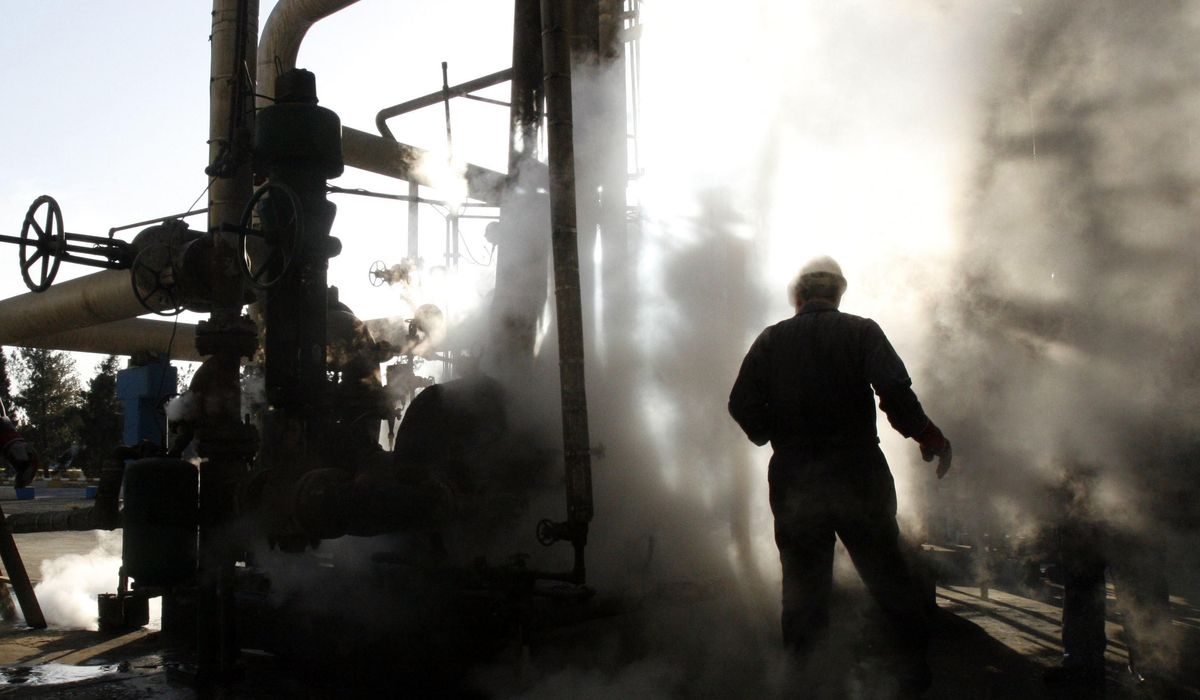
Chinese purchases of Iranian oil have steadily increased since President Biden arrived in office, with Beijing‘s blatant flouting of U.S. sanctions on the Islamic republic providing an economic lifeline to hard-liners in Tehran.
The White House has come under increasing criticism for tolerating Beijing‘s purchases, which analysts say amount to indirect Chinese support for Iran‘s nuclear weapons program, as well as Tehran‘s militant posturing and rejections of U.S. and European attempts to restore the 2015 Obama-era nuclear deal.
Talks on reviving the nuclear deal have stalled but will resume Nov. 29 in Vienna, European Union officials announced this week. It is unclear whether Washington and Tehran can move closer to resuscitating the agreement. Covert Chinese support for Iran‘s economy could make hard-line Iranian President Ebrahim Raisi even less motivated to negotiate.
At a moment when the Iranian government and military would otherwise be scrambling in the face of U.S. sanctions, China‘s flouting of the measures is “the one thing that’s keeping the Iranian regime afloat,” said Daniel Roth, research director at the bipartisan advocacy group United Against Nuclear Iran, which tracks Iranian crude oil purchases around the world.
“Without its oil revenues from China, the regime can’t export its terrorism across the region and into Europe. It doesn’t have the extra funds to pursue its illicit nuclear weapons and ballistic missiles or its drone warfare programs,” Mr. Roth said in an interview this week.
China was one of six international parties to the 2015 nuclear deal with Iran and is a permanent member of the United Nations Security Council. Still, Mr. Roth said, Beijing seems unconcerned that the Islamist government in Tehran is now advancing its nuclear activities far beyond limits set by the 2015 nuclear deal, as well as previous U.N. Security Council curbs.
Tehran says it has not been bound by the restrictions since President Trump repudiated the deal in 2018 and reimposed sanctions on Iran and its foreign trading partners.
“Does China actually care about Iran getting a nuclear weapon? I don’t think they’re particularly bothered by this question right now,” Mr. Roth said. “If China had to choose between stopping Iran [from] getting a nuclear weapon or maintaining Iranian oil supplies, China would choose the latter every time.”
Data compiled by United Against Nuclear Iran shows that nearly 1 million barrels per day of Iranian crude reached China in March and April. The volume has dipped in more recent months, to 586,000 barrels per day in October. Mr. Roth predicts the number will rise as winter energy needs increase.
The purchases have drawn scrutiny in national security circles since 2018, when Mr. Trump withdrew the United States from the multinational accord that gave Iran billions of dollars worth of sanctions relief in exchange for limits on the Islamic republic’s nuclear program.
The Trump administration attempted to uphold a global embargo on Iranian crude oil, the country’s main export and biggest earner of foreign currency. The embargo was part of a maximum pressure campaign aimed at halting Tehran‘s ballistic missile program and support of militant proxies in Iraq, Yemen, Lebanon and Syria, which were purposely left out of the 2015 deal.
Despite criticism of the Trump administration, the international community broadly complied with the oil embargo. Even China cut most of its purchases of Iranian crude by late 2019 and early 2020. Only about 11,640 barrels per day moved between Iran and China in February 2020, according to United Against Nuclear Iran.
As the 2020 U.S. presidential election approached, Beijing began increasing its purchases.
National security sources who spoke on the condition of anonymity told The Washington Times that they believe Chinese officials calculated that the U.S. would not punish Beijing over the purchases during the period of domestic political uncertainty.
Beijing tripled its purchases of Iranian crude during the months immediately after the election, when it became clear that the Biden administration would not deter such activity.
The White House declined to comment when pressed this week by The Times on whether the administration is considering more sanctions, such as “secondary” sanctions, on certain Chinese entities to pressure Beijing into halting its purchases from Iran.
A State Department spokesperson suggested that the administration is trying to convince Tehran that Washington is prepared to ease sanctions and rejoin the nuclear accord, known as the Joint Comprehensive Plan of Action, if Iran comes back into compliance with the deal.
Source of consternation
China‘s decision to purchase Iranian crude is a source of consternation inside the administration. National Security Adviser Jake Sullivan and Secretary of State Antony Blinken raised the issue in March during their first face-to-face talks with Chinese counterparts. The meeting, held in Alaska, was rife with tension and disagreements on multiple fronts.
“Our discussions in Anchorage included our concerns about [China‘s] purchases of Iranian oil, as well as other sanctions enforcement issues,” a senior administration official told The Times on the condition of anonymity at the time.
Reuters reported that Deputy Secretary of State Wendy R. Sherman raised the issue when she visited China in July.
Some analysts have speculated privately that the White House hopes Iranian officials understand that its tolerance of China‘s oil purchases is meant as encouragement to accept Mr. Biden‘s invitation to rejoin the nuclear deal.
However, the financial lifeline from Beijing to Tehran has seemed to only embolden Iran’s resistance to the Biden administration’s diplomatic and economic overtures. Biden administration officials acknowledge that they are exploring options if they can’t salvage the nuclear deal.
For months, Iran has refused to participate in any nuclear talks with U.S. officials present. Instead, it has engaged in “indirect” talks with officials from the other nations that were party to the 2015 deal: the United Kingdom, France, Germany, Russia and China.
On Wednesday, Iran signaled for the first time since Mr. Biden came to office that it would engage in talks with U.S. officials in Vienna at the end of this month. Announcing the development via Twitter, Iran‘s chief negotiator, Ali Bagheri Kani, said the goal of the talks will be the “removal of unlawful and inhumane sanctions” that the U.S. has imposed on Iran.
Republicans accuse Mr. Biden of looking the other way on the Chinese-Iranian economic lifeline in a bid to keep the 2015 deal from collapsing altogether.
“Every barrel of Iranian oil offloaded in Chinese ports is a violation of sanctions the United States put in place to starve revenue from Iranian terror and its nuclear program,” Nikki Haley, a former ambassador to the United Nations, wrote in an opinion piece for The Washington Post last month. “Yet the Biden administration leaves Chinese firms unpunished for doing business with the ayatollahs.”
Mr. Biden, she said, “may prefer negotiations, but they have only emboldened those who wish America ill.”
Some analysts say the Biden administration has undercut its own strategy by failing to uphold U.S. pressure on Iran.
Mark Dubowitz, a sanctions expert focused on Iran at the Foundation for Defense of Democracies, said that “no strategy against the Islamic Republic of Iran can be effective without sustained coercive pressure.”
“Going back in time, the situation is reminiscent of Ronald Reagan’s moment in history, when he came to believe that coercive measures would work to exploit Moscow’s weaknesses and help hasten the Soviet regime’s collapse,” Mr. Dubowitz wrote in an analysis published in September by The Jerusalem Strategic Tribune.
Mr. Dubowitz said Iran had begun “enriching uranium at 60%, manufacturing uranium metal, accumulating large stockpiles of fissile material, testing more advanced centrifuges, and stonewalling the International Atomic Energy Agency’s inquiries about nuclear-related activities.”








